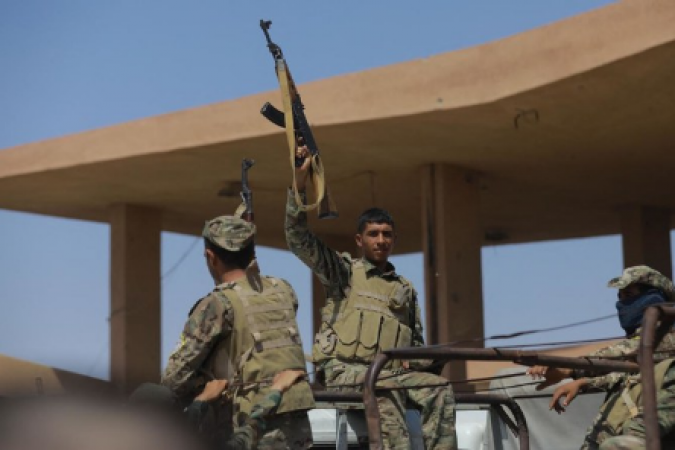
Damascus: A weeklong clash between rival US-backed militias in eastern Syria, an area where hundreds of American troops are stationed, is sounding alarm bells about potential disruptions in the coalition that has maintained stability against the defeated Daesh group for years. This volatile situation may present an opportunity for the radical group to reemerge.
Additionally, the violence underscores rising tensions between the dominant Kurdish population in the region and the predominantly Arab inhabitants, potentially creating an opening for Syrian President Bashar Assad, along with his allies Russia and Iran. They aim to challenge the presence of US troops and reestablish Damascus' authority in this oil-rich territory.
While eastern Syria has remained relatively under the global radar, it has hosted approximately 900 US troops, along with an undisclosed number of contractors, since the defeat of Daesh in 2019. These forces collaborate with the Syrian Democratic Forces (SDF), a coalition mainly composed of Kurdish fighters, to maintain stability.
Also Read: Shots Fired at Wuppertal Central Station in Germany, No Injuries Reported
Simultaneously, a Kurdish-led administration, supported by the US, has governed significant parts of northern Syria, including extensive areas east of the Euphrates River, which encompasses crucial oil fields. Syrian government forces and Iranian-backed militias have positioned themselves across the river on the western bank. Within this complex landscape, the region's Arab population has played roles in both the SDF and the administration, albeit harboring longstanding grievances against Kurdish control.
The recent clashes emerged between the Syrian Democratic Forces and an allied faction, the Arab-led Deir Ezzor Military Council. The trigger was the August 27 arrest of the council's commander, Ahmad Khbeil, also known as Abu Khawla, by the SDF. The SDF accused Khbeil of criminal activities, corruption, and establishing contacts with the Damascus government and Iranian-backed militias.
Subsequently, confrontations escalated as Khbeil's loyalists clashed with SDF fighters, eventually drawing hundreds of Arab tribesmen into the fray. These battles spilled beyond Deir Ezzor and led to tribal control over several villages outside the city. The violence has claimed a minimum of 90 lives and left numerous individuals wounded.
Kurdish leaders assert that Iranian-backed militias and the Syrian government have incited this violence. SDF spokesman Farhad Shami refuted claims that local Arab fighters participated in the clashes, suggesting that fighters loyal to Damascus had crossed the river to instigate hostilities. Elham Ahmad, leader of the Syrian Democratic Council, the SDF's political wing, contended that Iran and the Assad regime seek to frame the unrest as an ethnic conflict between Arabs and Kurds, ultimately aiming to compel the withdrawal of US troops.
Also Read: Deadly Rainstorms Ravage Greece, Turkiye, and Bulgaria, Leaving at Least 7 Dead and Many Missing
However, some observers argue that the violence reflects local Arab resentment toward Kurdish dominance. Opposition activists have reported ongoing discussions with tribal leaders to secure a ceasefire. One possible solution could involve naming a replacement for Khbeil and granting Arabs greater influence in local councils.
If the conflict persists, it could exacerbate divisions between Kurds and Arabs, potentially opening the door for Daesh remnants to stage a resurgence. The US military has emphasized the need to halt the fighting, warning that distractions from countering Daesh create instability and increase the risk of the group's resurgence.
Over the weekend, a meeting convened among SDF representatives, tribal leaders, and US officials, including Maj. Gen. Joel Vowell, commander of Operation Inherent Resolve, which oversees US military operations against Daesh. Their discussions emphasized addressing residents' grievances in Deir Ezzor, preventing civilian casualties, and achieving de-escalation promptly.
Despite these efforts, the SDF continued its offensive over the weekend, capturing two villages and besieging the primary stronghold of Arab tribesmen in Diban. While SDF chief commander Mazloum Abdi disclosed that the US-led coalition provided aerial support during the offensive, the US military neither confirmed nor denied this when contacted by the Associated Press.
Daesh once held significant territory in Iraq and Syria before its defeat following a protracted war led by the US and its allies, including the SDF. Although the group lost its last territorial foothold in eastern Syria in 2019, its sleeper cells have persisted in the region, perpetrating sporadic attacks over the years.
Myles B. Caggins III, a senior fellow at the New Lines Institute, warns that the ongoing clashes "present an opportunity for Daesh cells that nest in the Euphrates River Valley to emerge."
Additionally, the violence could provide an opening for Damascus and Iran, both of which seek the withdrawal of American forces from Syria. Iranian media quoted Khaled Al-Hassan, commander of the pro-government Baqir Brigade militia, characterizing the violence as a new uprising against the "American occupation and its militias," referring to the SDF.
During a recent visit to Iran, Syrian Foreign Minister Faisal Mekdad cautioned that "American occupation forces should withdraw ... before they are forced to do so."
Also Read: ASEAN Leaders Unite in Urgent Plea to Myanmar Junta: Halt Attacks on Civilians and Embrace Dialogue
Furthermore, in mid-July, dozens of Arab tribesmen and members of the pro-government National Defense Forces held a rally in Deir Ezzor province attended by a Russian general. An NDF commander asserted, "The end of American forces will be at the hands of Arab tribesmen who stand behind the Syrian army."
The conflict's potential consequences are manifold. It not only jeopardizes the fight against Daesh but could also bolster the positions of Syria's Assad regime and its allies, all while testing the stability of US-backed factions in eastern Syria. Amid these complexities, achieving a peaceful resolution remains an arduous challenge.